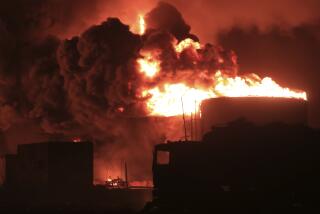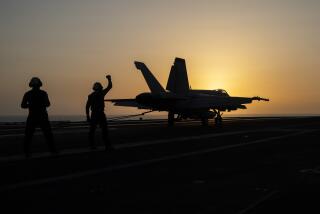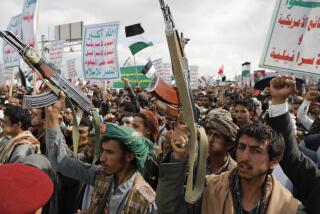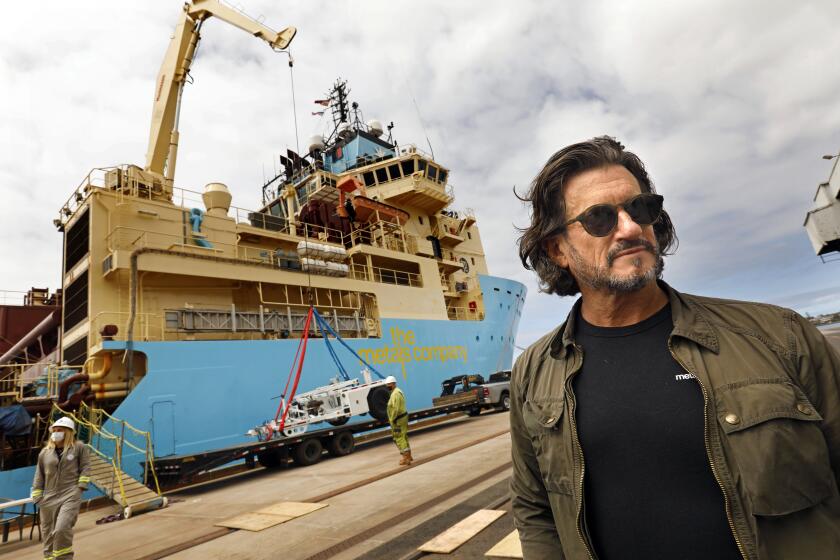Saudi-led Yemen air war’s high civilian toll unsettles U.S. officials
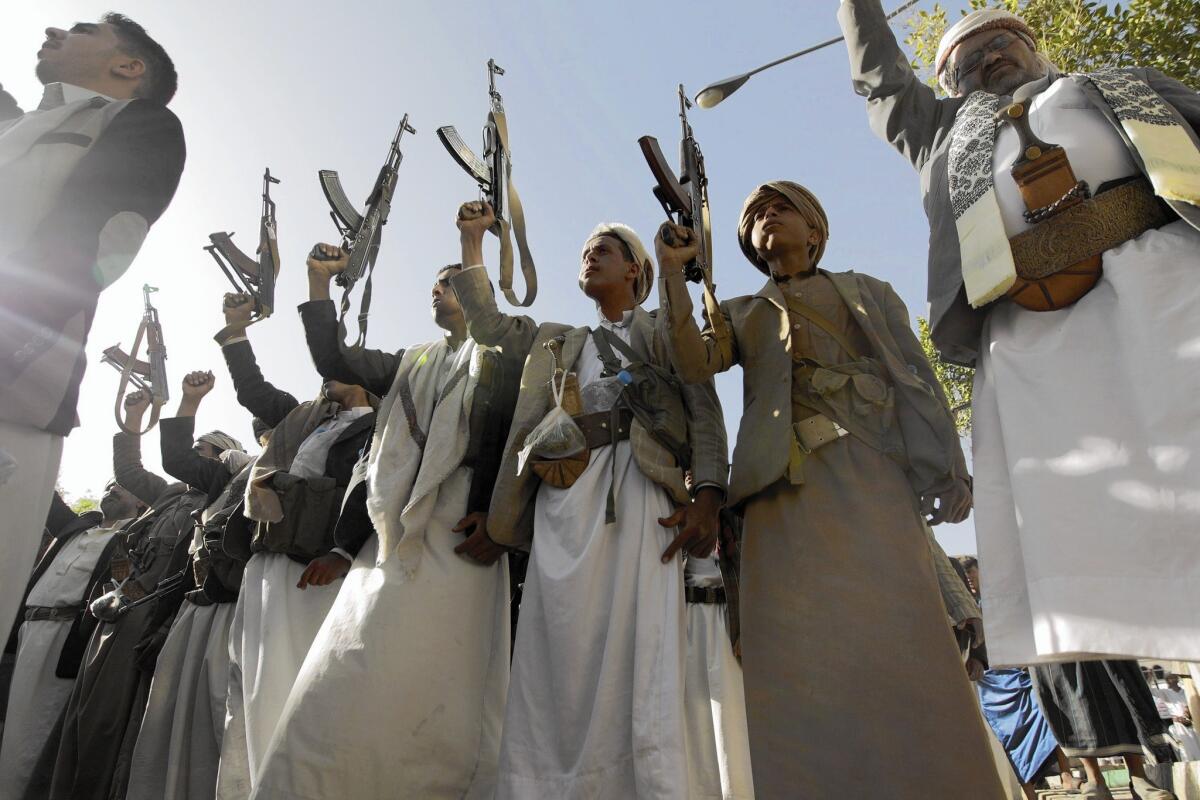
Concerned about reports of hundreds of civilian casualties, Obama administration officials are increasingly uneasy about the U.S. involvement in the Saudi-led air war against rebel militias in Yemen, opening a potential rift between Washington and its ally in Riyadh.
Backed by U.S. intelligence, air refueling and other support, Saudi warplanes have conducted widespread bombing of Yemeni villages and towns since March 26 but have failed to dislodge the Houthi rebels who have overrun much of the Arab world’s poorest nation since last fall.
Al Qaeda in the Arabian Peninsula, widely regarded as the terrorist network’s most lethal franchise, has capitalized on the chaos by sharply expanding its reach. Fighters loyal to the group claimed control Thursday of a military base and other key facilities near Mukalla, an Arabian Sea port in southern Yemen.
Saudi officials said they are not targeting areas with Al Qaeda fighters, however, and are focusing only on the Houthis, a Shiite Muslim minority whom they view as proxies for Iran, Saudi Arabia’s regional rival.
With the country sliding into civil war, the United Nations special envoy to Yemen, Jamal Benomar, resigned under pressure Wednesday. Officials said the Moroccan-born diplomat had lost the support of Saudi Arabia and its Persian Gulf allies.
Pentagon officials, who pride themselves on the care they take to avoid civilian casualties, have watched with growing alarm as Saudi airstrikes have hit what the U.N. this week called “dozens of public buildings,” including hospitals, schools, residential areas and mosques. The U.N. said at least 364 civilians have been killed in the campaign.
Although U.S. personnel don’t pick the bombing targets, Americans are working beside Saudi military officials to check the accuracy of target lists in a joint operations center in Riyadh, defense officials said. The Pentagon has expedited delivery of GPS-guided “smart” bomb kits to the Saudi air force to replenish supplies.
The U.S. role was quietly stepped up last week after the civilian death toll rose sharply. The number of U.S. personnel was increased from 12 to 20 in the operations center to help vet targets and to perform more precise calculations of bomb blast areas to help avoid civilian casualties.
U.S. reconnaissance drones now send live video feeds of potential targets and of damage after the bombs hit. The Air Force also began daily refueling flights last week to top off Saudi and United Arab Emirates fighter jets in midair, outside Yemen’s borders, so they can quickly return to the war.
Saudi officials say their goal is to pressure the Houthis to disarm and to reinstate President Abdu Rabu Mansour Hadi. That would require the Houthis to give up virtually all their gains since they captured the capital, Sana, in September and forced Hadi into exile in March.
Gen. Lloyd J. Austin III, commander of U.S. forces in the Middle East, was in Riyadh, the Saudi capital, on Thursday to consult with the kingdom’s leaders on their military plans.
A U.S. official, who spoke on condition of anonymity in discussing briefings on the air war, called it a “disaster,” saying the Saudis don’t have a “realistic endgame” for the bombing.
U.S. officials are especially concerned about Al Qaeda’s reemergence in Yemen after years of drone strikes and other counter-terrorism operations had pushed them into the shadows. A special U.S. counter-terrorism team was forced to abandon the country last month.
Fighters loyal to Al Qaeda claimed control of an airport, an oil terminal and a military base outside Mukalla, capital of Hadhramaut province, a stronghold for the terrorist group. This month, the militants robbed a bank and freed hundreds of inmates from a prison in the city. A U.S. official in Washington confirmed most the group’s claims.
“They are consolidating their hold of the city and will paralyze the whole coast of Hadhramaut,” Nasser Baqazouz, an activist in Mukalla, told the Associated Press. He said government troops guarding the airport put up little resistance.
Yemeni security officials in Sana, speaking on condition of anonymity because they were not authorized to brief the news media, said commanders of the military brigade responsible for protecting the area fled.
Although they are staunch opponents of Al Qaeda, the Houthis and their allies are caught up in fierce clashes with supporters of Hadi, who is supported by the Obama administration and Sunni Arab nations.
The White House took pains to tamp down reports of a rift with the Saudis, denying a statement by Iraq’s visiting prime minister, Haider Abadi, that President Obama had agreed with him that the Saudi airstrikes had gone “too far.”
Abadi did not back down but tried to play down the spat. “We have our own opinion on the war in Yemen,” Abadi said at the Center for Strategic and International Studies in Washington.
But U.S. officials also made it clear that they are looking for ways to resolve the crisis. They have not ruled out opening a line of communication with Houthi leaders, although so far intermediaries have been unable to broker an arrangement.
The U.S. has seen indications that Iran is providing weapons and equipment to the Houthis, White House Press Secretary Josh Earnest said Thursday.
“What continues to be unclear, and there is some skepticism about, is whether or not there is [Iranian] command and control of the activities of the Houthis in Yemen,” he said.
Earnest said the Saudis asked for help with the airstrikes, “and we have complied with that request in the form of providing intelligence and logistical support.”
What the U.S. “has always believed and continue to impress upon everyone involved in this situation is that our goal is to try to bring about a political resolution to the conflict,” he said.
At a Pentagon news conference, Defense Secretary Ashton Carter paused when asked whether the U.S. agreed with Saudi Arabia’s decision to bomb Yemen.
“Well, we supported it,” he said.
Gen. Martin Dempsey, chairman of the Joint Chiefs of Staff, said the Houthis aspire to restore an ancient empire “that included all of Yemen and parts of southern Saudi Arabia.”
“The Saudis are right to be concerned,” he said.
The issue is sure to be on the agenda when Obama meets leaders of the Gulf Cooperation Council — Saudi Arabia, the United Arab Emirates, Qatar, Kuwait, Oman and Bahrain — at the presidential retreat at Camp David next month. He initially invited them to address their concerns about a nuclear deal with Iran.
Analysts see U.S. support for the Saudi intervention as chiefly an attempt to maintain close ties with Riyadh, especially in regard to the emerging nuclear deal with Iran. Saudi officials have avoided public criticism of the April 2 preliminary deal.
“We’re doing this not because we think it would be good for Yemen policy; we’re doing it because we think it’s good for U.S.-Saudi relations,” said Ilan Goldenberg, a former Obama administration official who is now with the Center for a New American Security.
Bennett and Hennigan reported from Washington and Zavis from Riyadh. Times staff writers Michael A. Memoli and Paul Richter in Washington contributed to this report.
More to Read
Sign up for Essential California
The most important California stories and recommendations in your inbox every morning.
You may occasionally receive promotional content from the Los Angeles Times.
